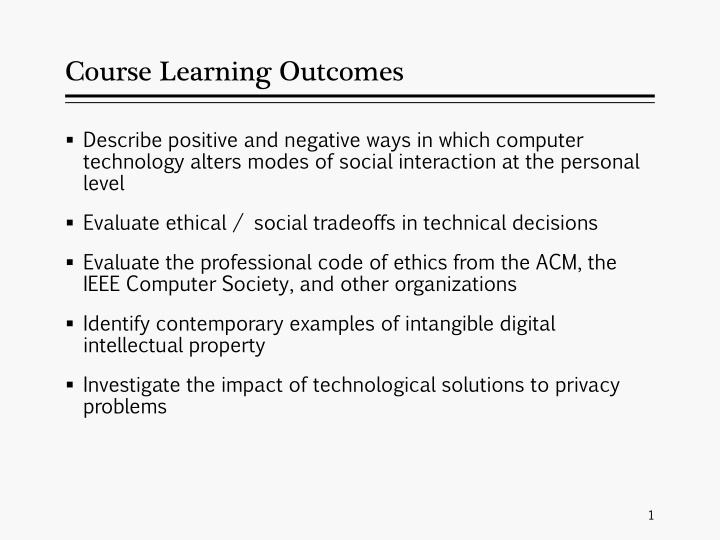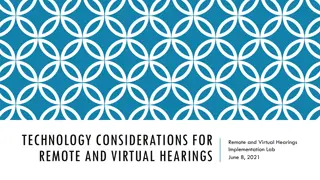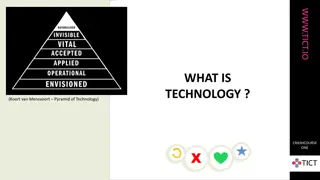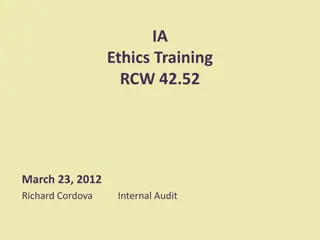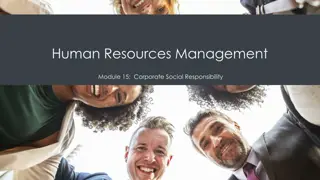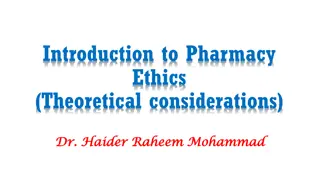Ethics in Computer Technology: Impact and Considerations
Explore the effects of computer technology on social interaction and ethics, evaluating tradeoffs, professional codes of ethics, digital intellectual property, and privacy solutions. Recommended resources and assignments on ethics and plagiarism are provided, along with objectives on organizational business ethics and decision-making approaches.
Download Presentation

Please find below an Image/Link to download the presentation.
The content on the website is provided AS IS for your information and personal use only. It may not be sold, licensed, or shared on other websites without obtaining consent from the author.If you encounter any issues during the download, it is possible that the publisher has removed the file from their server.
You are allowed to download the files provided on this website for personal or commercial use, subject to the condition that they are used lawfully. All files are the property of their respective owners.
The content on the website is provided AS IS for your information and personal use only. It may not be sold, licensed, or shared on other websites without obtaining consent from the author.
E N D
Presentation Transcript
Course Learning Outcomes Describe positive and negative ways in which computer technology alters modes of social interaction at the personal level Evaluate ethical / social tradeoffs in technical decisions Evaluate the professional code of ethics from the ACM, the IEEE Computer Society, and other organizations Identify contemporary examples of intangible digital intellectual property Investigate the impact of technological solutions to privacy problems 1
Recommended Resources Ethics for the Information Age, M.J. Quinn, 6th Edition, Pearson Education Ethical and Social Issues in Information Age, J. M. Kizza, 5th Edition, Springer-Verlag Ethics in Information Technology, G. Reynolds, 5th Edition, Cengage Course Technology A Gift of Fire, Social, Legal, and Ethical Issues for Computing Technology, S. Baase, 4th Edition, Pearson Inc 2
Assignment Zero Read the little book of plagiarism published by HEC. 3
Plagiarism What is it? Positive reasons for not plagiarizing Copying from single/multiple sources Paraphrasing, collusion How to avoid it? Reference list VS bibliography Plagiarism detection Penalty 4
ETHICS IN INFORMATION TECHNOLOGY, FOURTH EDITION Chapter 1 An Overview of Ethics
Objectives As you read this chapter, consider the following questions: What is ethics, and why is it important to act according to a code of ethics? Why is business ethics becoming increasingly important? What are organizations doing to improve their business ethics? Ethics in Information Technology, Fourth Edition 6
Objectives (contd.) Why are organizations interested in fostering good business ethics? What approach can you take to ensure ethical decision making? What trends have increased the risk of using information technology in an unethical manner? Ethics in Information Technology, Fourth Edition 7
What is Ethics? Moral code Set of rules Establishes boundaries of generally accepted behavior Different rules often have contradictions Morality Social conventions about right and wrong Widely shared Form basis for an established consensus Ethics in Information Technology, Fourth Edition 8
What is Ethics? (contd.) Morality may vary by: Age Cultural group Ethnic background Religion Life experiences Education Gender Ethics in Information Technology, Fourth Edition 9
Definition of Ethics Ethics Set of beliefs about right and wrong behavior Virtues Habits that incline people to do what is acceptable Vices Habits of unacceptable behavior Virtues and vices define a personal value system Scheme of moral values Ethics in Information Technology, Fourth Edition 10
The Importance of Integrity Integrity is a cornerstone of ethical behavior People with integrity: Act in accordance with a personal code of principles Extend to all the same respect and consideration Apply the same moral standards in all situations Lack of integrity emerges if you apply moral standards differently according to situation or people involved Many ethical dilemmas are not as simple as right versus wrong Ethics in Information Technology, Fourth Edition 11
The Difference Between Morals, Ethics, and Laws Morals: one s personal beliefs about right and wrong Ethics: standards or codes of behavior expected of an individual by a group Law: system of rules that tells us what we can and cannot do Laws are enforced by a set of institutions Legal acts conform to the law Moral acts conform to what an individual believes is the right belief of right and wrong Ethics in Information Technology, Fourth Edition 12
Ethics in the Business World Both the likelihood and the negative impact of inappropriate behavior have increased Several trends have increased the likelihood of unethical behavior: Globalization creating complex work environments Organizations challenged to maintain profits / revenue Heightened vigilance by: Employees Shareholders Regulatory agencies Ethics in Information Technology, Fourth Edition 13
Ethics in the Business World (contd.) Recent scandals in IT companies Satyam Computer Services (India) Hewlett Packard Computer Associates International IBM Not just executives, but even lower-level employees, can find themselves in the middle of an ethical dilemma Ethics in Information Technology, Fourth Edition 14
Why Fostering Good Business Ethics Is Important To gain the good will of the community To create an organization that operates consistently To foster good business practices To protect organization/employees from legal action To avoid unfavorable publicity Ethics in Information Technology, Fourth Edition 15
Gaining the Good Will of the Community Organizations have fundamental responsibilities to society Declared in formal statement of company s principles or beliefs Include: Making contributions to charitable organizations and non profit institutions Providing benefits for employees in excess of legal requirements Choosing economic opportunities that might be more socially desirable than profitable Ethics in Information Technology, Fourth Edition 16
Gaining the Good Will of the Community (cont d) Socially responsible activities create good will Good will makes it easier for corporations to conduct business Ethics in Information Technology, Fourth Edition 17
Creating an Organization That Operates Consistently Consistency ensures that employees: Know what is expected of them Can employ the organization s values to help them in decision making Consistency also means that shareholders, customers, suppliers, and community know what they can expect of the organization Ethics in Information Technology, Fourth Edition 18
